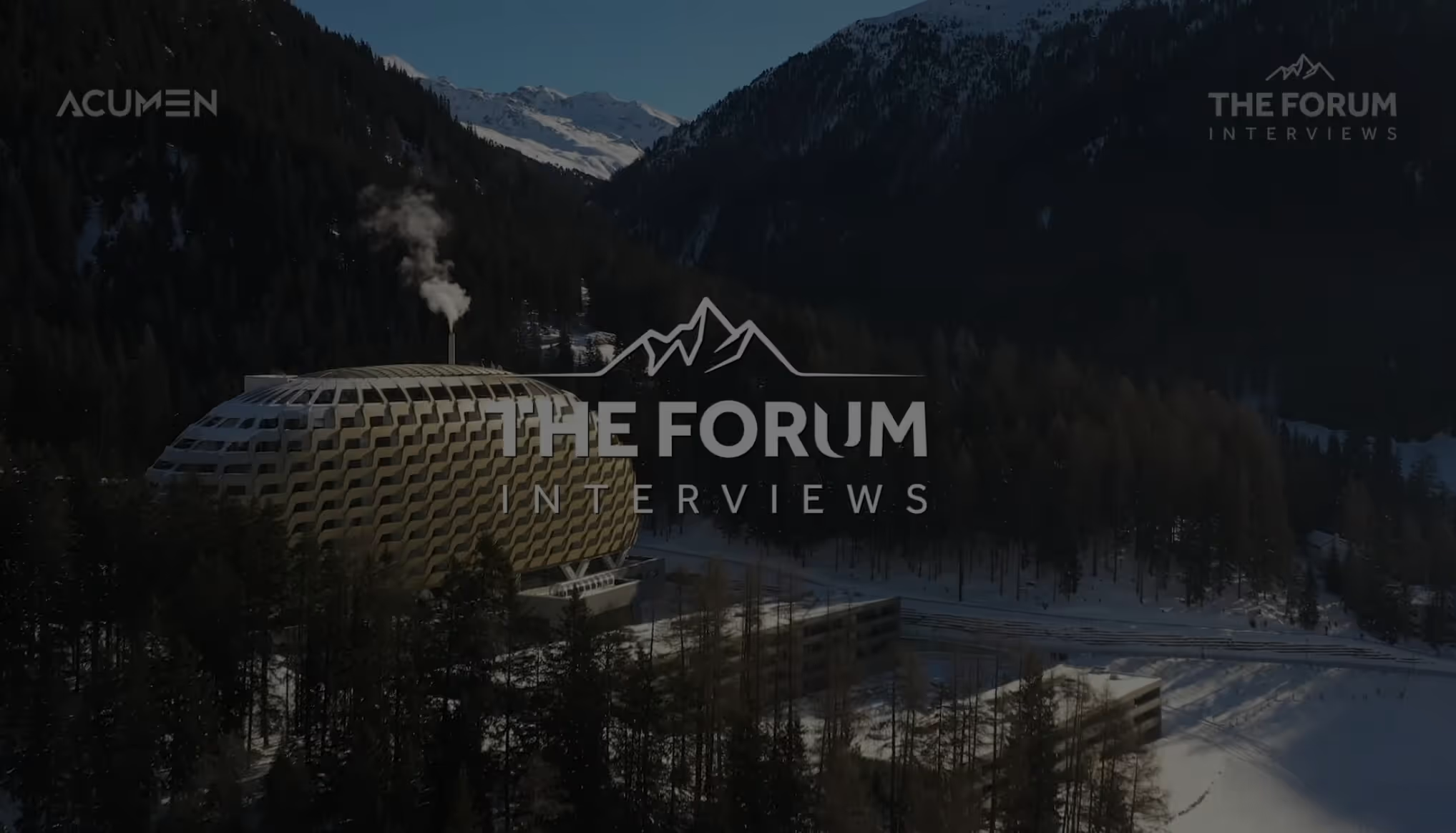BTS CEO and the Forum Interviews at Davos on Simulation Culture

Filmed and produced by Acumen Media as part of ‘The Forum Interviews’ series. For more information please visit: AcumenStories.
We help the world’s companies evolve towards a simulation culture
The concept of a simulation culture, which has long been harnessed by the tech industry, is now rapidly making its way into the mainstream business landscape. Simulation culture is an integral part of how high-performing teams find success. It is a philosophy of work, built on the idea that playing out scenarios, institutionalizing preparation, and role-playing future moves drives better decisions, improved ways of working, more profitable projects, higher win rates, closer client relationships and bottom-line growth.
Simulation culture has reached a critical point in its evolution because of the confluence of three factors. One is the explosive growth of artificial intelligence combined with high performance computing abilities which can now make simulation-based practices more immersive and accurate, and therefore more powerful. The second is macroeconomics forcing more frequent and rapidly evolving business cycles that are demanding business model adaptability. The third is a disappointment in the impact of most training as not being relevant enough, real-time, or at scale.
At BTS, our work with companies over the last thirty years has put us in a unique position to solve this challenge. From our origins in business simulation to our work today helping the world’s leading companies create change and transformation at scale, we understand what it takes to build a simulation culture and up the performance of teams every day.
Take our work with a global technology company. According to their EVP of Global Enablement, “We are a rapidly evolving, high-growth company. Our go-to-market strategy is always evolving. It’s critical that we bring our employees, particularly our customer-facing employees, along for the ride, in a meaningful and impactful way.” The answer to this was simulations. Through simulations and micro-simulations, employees across the enterprise got to experience different perspectives on the various parts of the business. People from different departments got to try new things, test out creative ideas, and fine-tune potential decisions by accessing real-time data and adjusting their approaches in a safe environment.
We worked with the company to embed simulations in four key ways: to connect with customers; kick off a sales year; prepare leaders for taking on C-Suite roles and evolving the company; and provide real time wisdom sharing to embed the lessons learned at scale.
The impact has been revolutionary to enabling the company’s go-to-market transformation. Organizationally, the company has found that implementing a simulation culture has led to greater alignment. With over 70,000 team members, group simulations allowed coworkers to practice cross functional teaming, prepare for inevitable moments of tension on a big initiative, and inspire each other to act in a way aligned with delivering on the company’s promise.
In summary, the trends that have created the environment for the rise of simulation culture – AI, macroeconomic disruption, and the need to pivot and scale new ways of working, fast – are only going to continue to demand more of leaders and their organizations. We look forward to partnering to lead the way.
Related content
Related content

From top-down to judgment all around: The AI imperative for organizations
Each business revolution has reshaped not only how businesses operate, but how they organize themselves and empower their people. From the industrial age to the information era, and now into the age of artificial intelligence, technology has always brought with it a reconfiguration of authority, capability, and judgment.
In the 19th century, industrialization centralized work and knowledge. The factory system required hierarchical structures where strategy, information, and decision-making were concentrated at the top. Managers at the apex made tradeoffs for the greater good of the enterprise because they were the only ones with access to the full picture.
Then came the information economy. With it came the distribution of information and a need for more agile, team-based structures. Cross-functional collaboration and customer proximity became competitive necessities. Organizations flattened, experimented with matrix models, and pushed decision-making closer to where problems were being solved. What had once been the purview of a select few, judgment, strategic tradeoffs, and insight became expected competencies for managers and team leads across the enterprise.
Now, AI is changing the game again. But this time, it’s not just about access to data. It’s about access to intelligence.
Generative AI democratizes access not only to information, but to intelligent output. That shifts the burden for humans from producing insights to evaluating them. Judgment, which was long the domain of a few executives, must now become a baseline competency for the many across the organization.
But here’s the paradox: while AI extends our capacity for intelligence, discernment, the human ability to weigh context, values, and consequence, is still best left in the hands of human leaders. As organizations begin to automate early-career work, they may inadvertently erase the very pathways and opportunities by which judgment was built.
Why judgment matters more than ever
Deloitte’s 2023 Human Capital Trends survey found that 85% of leaders believe independent decision-making is more important than ever, but only 26% say they’re ready to support it. That shortfall threatens to neutralize the very productivity gains AI promises.
If employees can’t question, challenge, or contextualize AI’s output, then intelligent tools become dangerous shortcuts. The organization stalls, not from a lack of answers, but from a lack of sense-making.
What organizations must do
To stay competitive, organizations must shift from simply adopting AI to designing AI-aware ways of working:
- Build new learning paths for judgment development. As AI replaces easily systematized tasks, companies must replace lost learning experiences with mentorship, simulations, and intentional development planning.
- Design workflows that require human input. Treat AI as a co-pilot, not an autopilot. Embed review checkpoints and tradeoff discussions. Just as innovation processes have stage gates, so should AI analyses.
- Make judgment measurable. Assess and develop decision-making under ambiguity from entry-level roles onward. Research shows the best learning strategy for this is high-fidelity simulations.
- Start earlier. Leadership development must begin far earlier in career paths, because judgment, not just knowledge, is the new differentiator.
What’s emerging is not just a flatter hierarchy, but a more distributed sense of judgment responsibility. To thrive, organizations must prepare their people not to outthink AI, but to out-judge it.

BTS acquires Nexo to strengthen its position in Brazil and Latin America
P R E S S R E L E A S E
Stockholm, May 5, 2025
STOCKHOLM, SWEDEN – BTS Group AB (publ), a leading global consultancy specializing in strategy execution, change, and people development, has agreed to acquire Nexo Pesquisa e Consultoria Ltda., Nexo, a boutique consulting firm headquartered in São Paulo, Brazil.
Nexo has been growing continuously since it was founded in 2017. With revenues of approximately 12 million Brazilian Reales (approx. 2.1 million USD) in 2024, and a highly capable team of 21 members, Nexo has built a strong reputation for delivering transformative projects in strategy, innovation, leadership, and culture.
Nexo collaborates with a great portfolio of clients across sectors such as financial services, consumer goods, and technology, assisting both local and global companies in navigating uncertainty, unlocking creativity, and activating strategy through people. Their work encompasses culture transformation, leadership development, employer value proposition, innovation culture, and vision alignment – supported by proprietary methodologies and frameworks.
BTS currently operates in Brazil servicing both local and multinational clients with a team of 13 employees. By acquiring Nexo, BTS not only increases the Group’s footprint in Brazil but also adds significant capabilities in culture and transformation services. Nexo’s client base has limited overlap with BTS, creating strong growth potential and synergy opportunities.
“Nexo is known for helping leaders and organizations tackle some of the most complex, human-centered challenges with creativity, empathy, and strategic clarity and the Nexo team is loved by their clients,” says Philios Andreou, Deputy CEO of BTS Group and President of the Other Markets Unit. “Their products and services complement and elevate our existing offerings, especially in culture transformation, and we are thrilled to welcome the Nexo team to BTS.”
“We’re excited to join BTS. We’ve long admired BTS’s approach and unique portfolio to support large organizations and leaders in connecting strategy with culture across the organization,” says Andreas Auerbach, co founder of Nexo. “Becoming part of BTS, allows us to scale our impact and bring more value to our clients while staying true to our values and culture,” adds Mariana Lage Andrade, co-founder of Nexo.
Upon completion of the transaction, Nexo’s business and organization will merge with BTS Brazil. Nexo’s founders will assume senior management roles in the joint operation.
The acquisition includes a limited initial cash consideration. Additional purchase price considerations will be paid between 2026 and 2028, provided Nexo meets specific performance targets. A limited portion of any such additional purchase price considerations will be paid in newly issued BTS shares. The transaction is effective immediately.
BTS’s acquisition strategy continues to focus on broadening our service portfolio, expanding our geographic reach, and enhancing our capabilities to support future organic growth in a fragmented market.
For more information, please contact:
Philios Andreou
Deputy CEO
BTS Group AB
philios.andreou@bts.com
Michael Wallin
Head of investor relations
BTS Group AB
michael.wallin@bts.com
+46-8-587 070 02
+46-708-78 80 19

High-performing teaming
Work today is too complex for individuals to succeed in isolation. Almost every critical decision, innovation, or transformation depends on teams working effectively together. Leaders rely on their teams to deliver results. Teams, in turn, rely on their leaders to create the conditions where performance is possible. This exchange, what leaders need from their teams, and what teams need from their leaders, sits at the heart of what we call teaming.
When teaming is strong, leaders get what they need from their teams [creativity, resilience, execution] and teams get what they need from leaders [direction, support, and the conditions to thrive]. It’s how strategy becomes action, how uncertainty becomes opportunity, and how businesses stay competitive in a fast-changing world.
